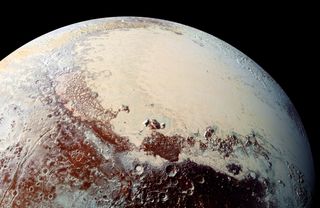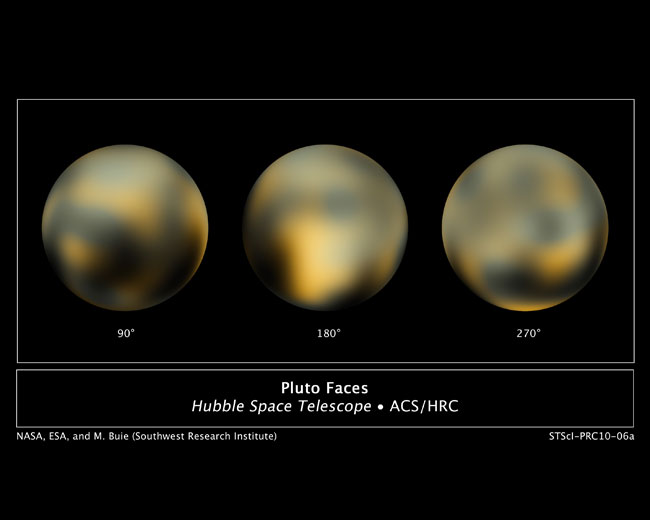Is Pluto a Planet Again 2016
Welcome Back, Pluto? Planethood Debate Reignites

The long-simmering argument about Pluto'south planethood has just flared up again.
For more than than 75 years after its 1930 discovery, Pluto was regarded equally our solar organisation's 9th planet — a distant and frigid oddball, to exist certain, but a fellow member of Earth'south firsthand family nonetheless. Then, in 2006, the International Astronomical Union (IAU) reclassified Pluto as a "dwarf planet," a newly created category that the organization explicitly stressed fabricated Pluto distinct from the eight "true" planets.
A true planet, according to the IAU's newly devised definition, must come across 3 criteria: Information technology must circle the sun and no other object (so, moons are out); it must exist big enough to be rounded into a sphere or spheroid past its ain gravity, simply not and so large that its innards host the fusion reactions that ability stars; and it must have "cleared its neighborhood" of other orbiting bodies. [Photos of Pluto and Its Moons]
Pluto failed at this last hurdle, because its neighborhood — the ring of icy bodies across Neptune known as the Kuiper Chugalug — is far from cleared.
Many scientists and Plutophilic members of the public objected strongly to the IAU's decision, on diverse grounds. For starters, some folks pointed out, the new planet definition rules out anything non orbiting the sun — meaning that the hundreds of billions of exoplanets in our Milky Way galaxy aren't planets at all, at least according to the IAU.
And the "articulate your neighborhood" requirement seemed ridiculous to many researchers, including Alan Stern, the chief investigator of NASA's New Horizons mission, which famously flew by Pluto in July 2015. Stern has been a vocal proponent of Pluto'due south planethood and has argued that the IAU's decision stemmed at to the lowest degree partly from a very nonscientific desire to keep the solar system's planetary stable down to a "manageable" number.
Which brings us to the most recent flare-up. Stern and planetary scientist David Grinspoon have just published a book near the Pluto flyby, called "Chasing New Horizons: Inside the Epic Beginning Mission to Pluto" (Picador, 2018). On Monday (May 7), The Washington Post published a "Perspectives" slice the ii scientists wrote titled, "Yes, Pluto Is a Planet."
In the slice, Grinspoon and Stern took aim at the IAU'due south "hastily fatigued" and "flawed" planet definition, reserving special ire for the "clearing your neighborhood" requirement.
"This benchmark is imprecise and leaves many deadline cases, but what's worse is that they chose a definition that discounts the actual concrete properties of a potential planet, electing instead to define 'planet' in terms of the other objects that are — or are not — orbiting nearby," the scientists wrote. "This leads to many bizarre and cool conclusions. For case, it would mean that Earth was not a planet for its commencement 500 meg years of history, because it orbited amongst a swarm of debris until that time, and also that if you took World today and moved it somewhere else, say out to the asteroid belt, it would stop beingness a planet." [Destination Pluto: NASA'south New Horizons Mission in Pictures]
The duo pushed instead for a much simpler "geophysical planet definition," which was presented last spring at a planetary science conference in Texas. And this definition is indeed simple; boiled down, it holds that planets are "round objects in space that are smaller than stars."
Under this definition, Pluto and other dwarf planets, such as Ceres and Eris, are considered planets, equally are large moons like Jupiter'southward Europa, Ganymede, Io and Callisto and Saturn'southward huge satellite Titan (equally well every bit World's own moon). Indeed, the solar system's planet count would easily top 100 if everyone agreed to use the geophysical definition.
But getting such widespread agreement about this, and about Pluto'southward "official" classification, will be a hard row to hoe. For example, astrophysicist and author Ethan Siegel argued in a slice for Forbes on Tuesday (May 8) that a cosmic object's environmental context is important to agreement the object's nature.
"The simple fact is that Pluto was misclassified when it was first discovered; information technology was never on the same footing as the other eight worlds. The 2006 motility by the IAU was an incomplete attempt to repair that mistake," Siegel wrote.
The geophysical definition, he added, "is a step in the opposite management: It's a pace towards making a larger, more disruptive error that will render a definition meaningless to the majority of people who use it."

And then there'south the pithy take past California Establish of Technology astronomer Mike Brown, whose discovery of outer-solar-system objects helped spark the rethink of Pluto's place in the solar arrangement.
"So, hey, Pluto is yet not a planet. Actually, never was. We just misunderstood it for fifty years. Now, we know better. Nostalgia for Pluto is really non a very proficient planet argument, merely that'due south basically all there is. Now, let's go on with reality," Brown wrote via Twitter, where his handle is @plutokiller.
Will the geophysical planet definition grab on? Will the IAU welcome Pluto back into the "truthful planet" fold, along with Ceres, Europa, Titan, Earth's moon and many other objects? Who knows? But it seems articulate that people will exist fighting nigh this stuff for a long time to come.
Follow Mike Wall on Twitter @michaeldwall and Google+. Follow us @Spacedotcom, Facebook or Google+. Originally published on Space.com.
Bring together our Space Forums to proceed talking space on the latest missions, night heaven and more than! And if you have a news tip, correction or annotate, permit u.s.a. know at: community@space.com.
Source: https://www.space.com/40550-pluto-planet-debate-flares-up-again.html

0 Response to "Is Pluto a Planet Again 2016"
Post a Comment